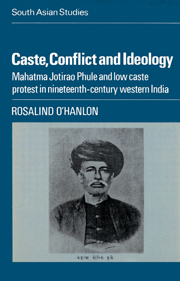 Caste, Conflict and Ideology
Caste, Conflict and Ideology Book contents
- Frontmatter
- Contents
- Acknowledgements
- Notes on translations and area under study, with map
- Part 1 Introduction
- Part 2 Religion and society under early British rule
- Part 3 Jotirao Phule and his circle: the emergence of a distinctive radical voice
- Part 4 The creation of a lower caste identity in history and popular culture, 1869–73
- Part 5 The lower caste community in contemporary society
- 11 Religious emancipation and political competition
- 12 Social protest and the construction of a religious ethic
- 13 Traditional privileges and new skills: Phule's analysis of the nature of Brahman power
- 14 The Satyashodhak Samaj in the 1870s
- Part 6 Ideology and the non-Brahman movement in the 1880s
- Bibliographic note
- Bibliography
- Glossary
- Index
13 - Traditional privileges and new skills: Phule's analysis of the nature of Brahman power
from Part 5 - The lower caste community in contemporary society
Published online by Cambridge University Press: 14 October 2009
- Frontmatter
- Contents
- Acknowledgements
- Notes on translations and area under study, with map
- Part 1 Introduction
- Part 2 Religion and society under early British rule
- Part 3 Jotirao Phule and his circle: the emergence of a distinctive radical voice
- Part 4 The creation of a lower caste identity in history and popular culture, 1869–73
- Part 5 The lower caste community in contemporary society
- 11 Religious emancipation and political competition
- 12 Social protest and the construction of a religious ethic
- 13 Traditional privileges and new skills: Phule's analysis of the nature of Brahman power
- 14 The Satyashodhak Samaj in the 1870s
- Part 6 Ideology and the non-Brahman movement in the 1880s
- Bibliographic note
- Bibliography
- Glossary
- Index
Summary
Introduction
The basic elements of Phule's analysis of Brahman power had changed little during the decade and a half that followed the writing of The Third Eye. While the argument of the corruption of Brahman officials in the British administration was a relatively easy one to convey to a popular audience, however, the rejection of the religious authority of Brahman priests was a much more difficult matter. The crucial practical point at which a potential follower would have to make such a rejection came in the performance of the numerous rituals which convention demanded of the pious Hindu. The necessity of a Brahman priest for the performance of any ceremonial act of importance would have appeared to a potential follower as a sacred and unalterable reality of religious life. The very extremism of Phule's anti-Brahman polemic from the late 1860s may be explained in part in the need for a degree of emotional conviction which would match that with which older beliefs had been held. His attempt to evoke this kind of response focused on the portrayal of the figure of ‘the Brahman’ as a unique assemblage of all imaginable social and moral evils. As in The Third Eye, the idea of a tightly controlled conspiracy underlay much of his description. The different areas of Brahman activity – in the religious and economic life of the village, in the new local and provincial political institutions, in the religious reform societies and the social reform movement amongst Brahmans – were but varying manifestations of an essentially unitary force.
- Type
- Chapter
- Information
- Caste, Conflict and IdeologyMahatma Jotirao Phule and Low Caste Protest in Nineteenth-Century Western India, pp. 206 - 219Publisher: Cambridge University PressPrint publication year: 1985


